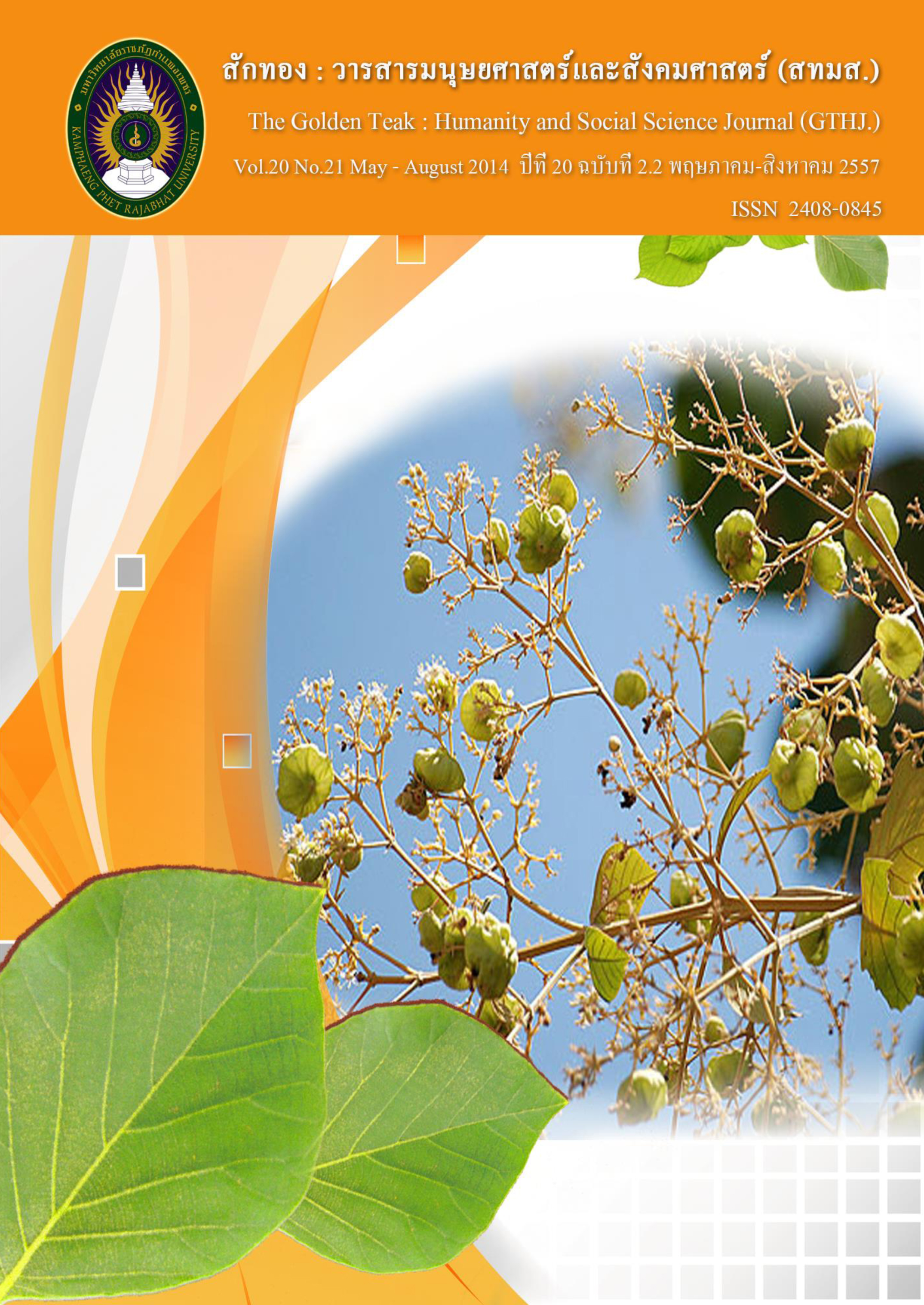Participatory Action Research of Private SchooL Administration using Balanced Scorecard Approach : A Case Study of Kanjanawittaya School Chonburi Province
Main Article Content
Abstract
ABSTRACT
The purposes of this study were to apply balanced scorecard technique with the educational administration, to find the appropriate balanced scorecard processes which fit with the educational administration, and to assess the evaluation of using balanced scorecard in educational administration. The technique used in this research was Participatory Action Research (PAR) according to the study by Kemmis and Mc Taggart (1988). The research process composed of 5 phases which are 1) Research Preparation, 2) Feasibility Study, 3) Planning, 4) Implementation and Monitoring, and 5) Evaluation . The primary data were collected from 32 representatives of school stakeholders in Kanjanawittaya school, Chonburi province as the case study. The 32 samples consisted of 1 school vice director, 5 teachers, 3 committees of school board in basic education, 10 parents and guardians, 10 students and 3 community. The whole data in each phase were analyzed by using Brain Storming technique. The research results discovered that there were 4 perspectives (Student Perspective, Internal Process Perspective, Learning & Developing Perspective, and Budget & Resource Perspective) which were suitable to apply balanced scorecard technique in educational administration. Whereas there were 10 processes of balanced scorecard that were appropriate with educational administration after preparation period. These 10 processes were 1) Be prepared for teamwork, 2) Analyze school conditions, 3) Identify workshop, 4) Determine strategic plan, 5) Build balanced scorecard, 6) Define and revise Key Performance Indicators (KPIs), 7) Specify Responsible Units, 8) Illustrate details of Key Performance Indicators (KPIs), 9) Determine Strategy into action, and 10) determine plan into action. A part from school administration using balanced scorecard evaluation in Kanjanawittaya School, this study was discovered that 28 KPIs were succeeded and every KPIs was reached higher than the expected goal. This study was also found 4 key success factors which were 1) Executive Leadership, 2) Management Skills, 3) Dynamic Participatory Action Research, and 4) Continuous and Sustainable Systematic Development. All the processes derived from participation of stakeholders which affected the quality of learners according to educational standards.
Article Details
บทความที่ได้รับการตีพิมพ์เป็นลิขสิทธิ์ของวารสาร สักทอง : วารสารมนุษยศาสตร์และสังคมศาสตร์ สถาบันวิจัยและพัฒนา มหาวิทยาลับราชภัฏกำแพงเพชร
ข้อคิดเห็นใดๆ ที่ปรากฎในวารสารเป็นวรรณกรรมของผู้เขียนโดยเฉพาะ ซึ่งมหาวิทยาลัยราชภัฏกำแพงเพชรและบรรณาธิการไม่จำเป็นต้องเห็นด้วย
References
เกริกยศ ชลายนเดชะ. (2556). การนำกลยุทธ์ไปสู่การปฏิบัติ. วันที่ค้นข้อมูล 19 มกราคม 2557 เข้าถึงได้จาก http://www.stou.ac.th/schools.
ไชยวัฒน์ พุทธานุ. (2550). บทบาทผู้ปกครอง. วันที่ค้นข้อมูล 10 ธันวาคม 2551 เข้าถึงได้จาก http://gotoknow.org/blog/kpss/135768.
ประเวศ วะสี. (2541). การปฏิรูปการศึกษายกเครื่องทางปัญญาทางสมองแห่งความหายนะ. กรุงเทพมหานคร: มูลนิธิสดศรี-สฤษดิ์วงศ์.
________. (2555) “จุดเปลี่ยนมหาวิทยาลัยไทย-จุดเปลี่ยนประเทศไทย” ใน โพสต์ทูเดย์ ปีที่ 10 ฉบับที่ 3463 ประจำวันที่ 31 กรกฏาคม 2555 หน้า 2 สาขาวิชาการบริหารการศึกษา. บัณฑิตวิทยาลัย : มหาวิทยาลัยราชภัฎเชียงราย.
พิชัย เสงี่ยมจิตต์. (2542). การจัดระบบบริหารงานเฉพาะด้านในสถานศึกษา เอกสารการสอนการวัดระบบงานเฉพาะด้านในสถานศึกษา. อุบลราชธานี : สถาบันราชภัฏอุบลราชธานี.
พันธ์ทิพย์ รามสูตร. (2540). การวิจัยเชิงปฏิบัติการอย่างมีส่วนร่วม. กรุงเทพฯ: สถาบันพัฒนาการสาธารณสุขอาเซียน มหาวิทยาลัยมหิดล.
รับรองมาตรฐานและประเมินคุณภาพการศึกษา (องค์การมหาชน), สำนักงาน. (2554). รายงานการประเมินคุณภาพภายนอก (พ.ศ. 2554-2558). กรุงเทพฯ : สำนักงานรับรองมาตรฐานและประเมินคุณภาพการศึกษา (องค์การมหาชน).
โรงเรียนกาญจนะวิทยา. (2555). รายงานประเมินตนเอง : SAR. ชลบุรี : โรงเรียนกาญจนะวิทยา.
วิชิตวงศ์ ณ ป้อมเพชร. ( 2553 ). ปฏิรูปการศึกษา แนวคิดและข้อเสนอแนะ. กรุงเทพฯ : วศิระ
วีระเดช เชื้อนาม. (2547). เขย่า Balanced Scorecard แล้วลงมือทำ ทีละขั้นตอน ตลอดแนว. กรุงเทพฯ :เฟื่องฟ้าพริ้นติ้ง.
สมโภชน์ เอี่มมสุภาษิต. (2540). การปรับพฤติกรรม. กรุงเทพฯ : สำนักพิมพ์จุฬาลงกรณ์
Kemmis, S., & McTaggart, R. (1988). Participatory action research. In N. Denzin & Y. Lincoln (Eds.),Handbook of qualitative research. Thousand Oaks, CA: Sage.
Kaplan, R. S. and D.P. Norton (1996) The Balanced Scorecard: Translating Strategy into Action, Boston: HBS Press.


